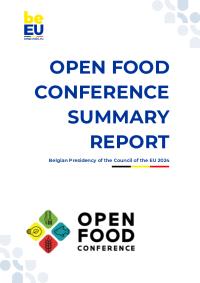11–13 March 2024. Leuven, Belgium. Open Food ConferenceFor three days, international and national stakeholders reflected on the challenges and prospects of a sustainable food system. More than 650 registrations from 42 countries, over 170 speakers, 27 parallel
sessions and 4 plenary sessions. These were the main ingredients for an open
dialogue on food policy at the Open Food Conference.
- The summary report (54 pp.) of the Open Food Conference is ready and can be found here: Open Food Conference Summary Report | Vlaanderen.be
- The report also contains links to the presentations and recordings of several thematic sessions.
- More info on the Open Food Conference can be found here: Go4Food - Food strategy of Flanders | Landbouw en Zeevisserij (vlaanderen.be) and pictures that have been taken during the conference can be found here: Agentschap Landbouw en Zeevisserij | Flickr
Keynote by Timothy Searchinger (see picture), Senior Research Scholar at Princeton's Center for Policy Research on Energy and the Environment and Senior Fellow and Technical Director of the Food Program at the World Resources Institute
11/03 Debate on sustainable food systems: transition and systemic approach
- Stefanos Fotiou, Director in the Office of Sustainable Development Goals in FAO and Head of the UN Food Systems Coordination Hub.
"The true cost of food needs to be internalized, the hidden cost needs to be seen"
"We need to stop out-sourcing our food production"
"Reduce the land-use of which majority is to be used to feed the people [not for biofuels]"
"Chicken production emits less greenhouse gasses than plant based alternatives, if land-use is not accounted for"
"Flap meats are a central ingredient in the Pacific Islanders’ favorite dish, chop suey. The consequence of this trade in ‘cheap meat’ is skyrocketing rates of obesity and diabetes in Pacific Island states. Seven out of ten of the most obese nations on earth are in the Pacific. This is attributable to a diet high in fatty, highly-processed foodstuffs exported to the Pacific from Australia, New Zealand and the United States of America."
"Israel is exporting citrus to Turkey and Greece at half the prize of local production, at the cost of exporting fossil ground water"
- Elisabeth Hidén, Vice president of European Council for Young Farmers (CEJA) and dairy farmer
- Dirk Jacobs, Director General, FoodDrinkEurope
- John Bell, European Commission – Directorate-General for Research and Innovation (RTD)
"Research, Science and Innovation have to give hope to the citizen and advise to policy makers"
"The Research, Science and Innovation Directorate of the European Commission developed 11 pathways for the food systems transition"
"35 billion is needed for farmers to transit to sustainable agriculture" - Moderated by Natasha Foote
11/03 Synergies in EU, national and regional food strategies
What are the expectations for a European, national and regional food system strategy and how can they better work together?- Joke Schauvliege, Member of the European Committee of the Regions and Flemish Parliament
- Coline Questiaux, Good Food Brussels
- Kris Roels, Agentschap Landbouw en Zeevisserij
- European Regions, Regions and Innovation Network (ERRIN)
- Angèle Liaigre, Cities Northern Netherlands EU Office, European Regions, Research and Innovation Network (ERRIN)
- Luisella Ciani, European Food Forum
The European Food Forum (EFF) was founded in November 2019 by 5 Members by of the European Parliament (MEP) from 3 different political groups and 5 different Member States
12/03 Financial instruments - Innovation financing the transition
Food systems transformation is a costly affair. How do we address the gap, which is estimated between 38 and 50 billion euros per year? As we all know, it takes more than what existing instruments can deliver to deliver on the badly needed, accelerated transformation of our food systems. How do we as Europeans plan to accelerate and create the space for more funding? This session discussed existing financial instruments, their limits and new models, ventures, opportunities to fund the transformation of food systems.
Download the Presentation
- Michiel de Ruiter, Chairman Supervisory Board, EIT Food
"We have a portfolio of 120 start-ups in Europe" - Adelaide Cracco, Head of Greentech Investments, European Investment Fund (EIF)
- Pawel Kazmarek, Board member and farmer, Foundation Terra Nostra Poland
For several years, the Terra Nostra Foundation has been supporting farmers in converting from conventional agriculture to regenerative agriculture. The Foundation encourages farmers to implement regenerative practices aimed at using the potential of the soil, producing nutritious food with lower inputs, and at the same time caring for the natural environment.
Agrointegration Poland - Agro Integracja was established on the basis of two dynamic
agricultural consulting companies operating mainly in the Greater Poland region. The main goal of the company is to integrate agricultural communities, including: on establishing and running producer groups. We serve over 70 groups of producers of pigs, beef cattle, milk, sugar beets, cereals and rapeseed. - Lieven Van Waes, Belgian Presidency representative
13/03 International chain development and sectoral initiatives: how to come up with an integral and coherent policy
Despite several industry’s voluntary commitments to sustainability, the path to
sustainable food systems is a journey of ups and downs, riddled with questions. How
can companies, civil society, government actors and knowledge institutions
collaborate to enhance sustainability in international chains and address the
multiple challenges in a holistic way? How can stakeholders use and implement the
different tools and strategies available, from value chain experiments, over nonbinding sectoral agreements to upcoming mandatory due diligence legislation at
EU level?
Download the Presentation
- Abou Dosso, Ambassador Ivory Coast to Belgium, Luxembourg & EU
- Antonie Fountain, Voice Network
- Charles Snoeck, IDH Sustainable Trade
- Karen Janssens, Colruyt Group
- Liesbeth Van Meulder, Rikolto
- Barbara Creemers, Federal Parliament Belgium (Groen) Moderated by Jelle Goossens (Rikolto)
13/03 African and European food systems and the external impacts of food and climate policies
African and European food systems are closely intertwined, linked directly and indirectly through trade, investments, development support, cross-border pollution, policy spillovers and others. In this policy mix, opportunities for Africa-Europe cooperation on food systems are plenty, as evident in the thriving food trade between Africa and Europe. But when one’s policy does not align with what a partner envisions or carries costs, tensions can arise as well.
This dialogue made these opportunities and tensions more explicit and asked:
This dialogue made these opportunities and tensions more explicit and asked:
- Where are the options for cooperation and the areas of tension between the two continents regarding food systems?
- What are the governance and policy changes needed to align stronger and lower unintended consequences?
- What are the roles of support agencies, like FAO, in assisting such transformation?
- Are Africa and Europe drifting apart or sailing together more?
Panel:
- Bitange Ndemo, Kenya's Ambassador to Belgium & EU and Professor of Entrepreneurship
- Andrea Alfieri, European Commission – Directorate-General for International Partnerships (DG INTPA)
- Adriana Opromolla, Advocacy lead at Alliance2015 Hub - Alliance2015 is a strategic network of seven European non-government organisations engaged in humanitarian and development action. Our members are ACTED/France, Ayuda en Acción/Spain, Cesvi/Italy, Concern Worldwide/Ireland, HELVETAS /Switzerland, People in Need/Czech Republic and Welthungerhilfe/Germany.
- Boitshepo Bibi Giyose, Head of nutrition at AUDA-NEPAD (African Union Development Agency)
- Daniel Adeniyi (ECDPM)
- Moderated by Koen Dekeyser, European Centre for Development Policy Management (ECDPM)








No comments:
Post a Comment